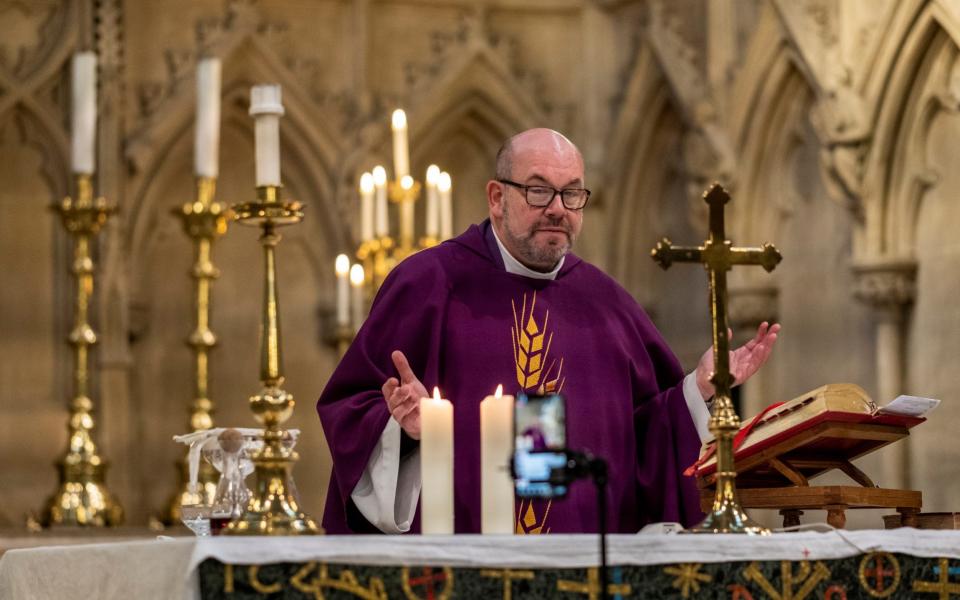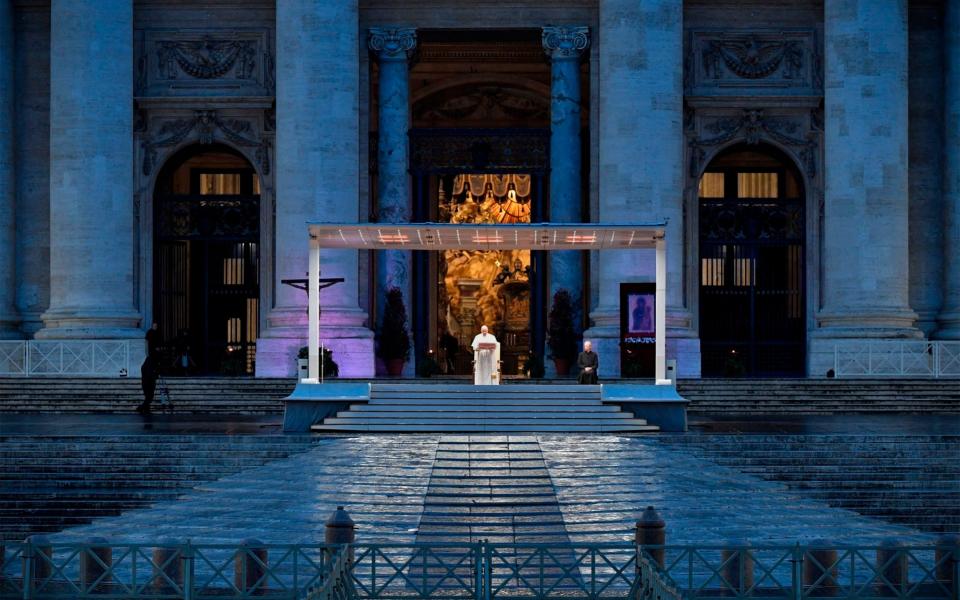Holy Week in lockdown – an Easter like no other


Are you looking for advice on how to celebrate Easter during lockdown? Join Tim Stanley in the comments section of this article at 12pm (BST) to chat about adapting your Easter traditions.
This is going to be one of the toughest Holy Weeks in history. Easter is the high point of the Christian year – and yet millions of believers across the world will spend it separated from their ministers, their temples and their liturgies. It is as if a body had been dislocated. According to Rev Jago Wynne, rector of Holy Trinity Clapham: “The Bible talks about the church as a spiritual family, so being apart from each other is very strange. It brings a sense of grief and mourning.”
In fact, the UK government did not force the churches to close – civil servants banned public services, it’s true, but they invited them to remain open for private prayer. It was the churches themselves who said they wanted to “show leadership” and so asked to be ordered to shut. It’s a decision that has led to some confusion and despair, even the odd conspiracy theory, but also to innovation and optimism.
“It’s a desert time,” says Rev Wynne. “But even in the desert time, there is hope, because Jesus was dead and he came back to life, and the fact that he is alive transforms everything.”
In many ways, the lockdown seems timed to reflect Jewish and Christian themes of loss and imprisonment: the next few days are the Jewish passover, when Jews commemorate their enslavement in Egypt, and it marks the end of Lent, when Christians believe Jesus wandered the desert alone, being tempted by the Devil.
Today, Maundy Thursday, was when Jesus had his final supper with the disciples; tomorrow, Good Friday, was when he was crucified. For me, this has always been a period of self-denial even without the lockdown: like a lot of Catholics, I try to give something up in Lent, crowned by almost 48 hours of fasting between Good Friday and Easter Sunday (just some bread and water, perhaps a cheeky packet of crisps).
Where the emotional narrative of the gospels will depart from the lockdown, however, will be Easter Sunday, which is supposed to be a day of resurrection, joy and coming together – just as the Jewish passover is a series of meals that unites the family. The lockdown, alas, has no end in sight. It’s as if Lent just keeps on going.

Time, then, to consider what we’ve lost. Isolation brings home the social dimension of religion – that it’s not only about me and my relationship with God but about being part of a community of believers. Some churches have adapted fast by moving online, live-streaming services and prayer meetings. Rev Richard Battersby, who leads a bishop’s mission order in Rural Ainsty, north Yorkshire, has always had a challenge navigating a parish that amounts to five churches over 20 square miles: as soon as the lockdown hit, he decided to “embrace this opportunity to reach out and be in people’s living rooms”.
Rev Battersby prefers to hold services with a chatroom open, so viewers can interact (“I liken it to watching a football match on the sofa with other people”), and says that not only is attendance up, not only do people come from far and wide – you might call it church tourism – but also old relationships have been rebuilt.
“It’s been a good experience for people who find a physical church a barrier,” he says, particularly those who’d rather not go to a drafty old building on a cold Sunday morning, and he is convinced that what we’re going through isn’t just a temporary measure but the wave of the future. “It’s not about doing old things in new ways. It’s about a changing church using changing channels. Some of the new things you’re seeing being done won’t go away when the lockdown is over.”
This is an important point that believers have to confront: many churches were not in the best of health before the coronavirus hit. Ergo, something has to change – and this might be the opportunity.
Vocations across denominations are historically low. When the names and photos of Italian priests who had died of Covid-19 was published, many people commented on how old they were, and I’m convinced that one reason why the churches in Britain were so keen to shut is that they knew that so many of their clerics fall into the category of “most at risk”. Critics grumbled that bishops had retreated into health safety, or that they haven’t developed a compelling response to the trauma beyond the rather worldly plea to “stay at home and help the NHS”.

When Pope Francis delivered a stunningly choreographed address to an empty St Peter’s Square, the image could have been read in two ways: a message of light in the midst of darkness, yes, but one also got the impression of the Pope as the “last man standing”, or the captain going down with his ship.
A few days ago, Catholic Bishop Philip Egan published an open letter raising questions about the lockdown, and was refreshingly honest about its cost: “Covid-19 will have a deep financial impact.” Donations are almost certainly drying up; many churches might never reopen. There’s a worry among many ordinary clergy that, after several weeks in isolation, lazy people like me will lose the habit of going on a Sunday altogether, which for Catholics is an especially bad thing. As the old saying goes, Protestants go to church whereas Catholics go to Mass, and for us it isn’t just an “ideal” thing to do but a moral obligation.
Fr Stephen Morrison, a Norbertine monk at St Philip’s Priory in Chelmsford, points out that at a Catholic Mass, the bread and wine, as per the Maundy Thursday supper, is believed to become the body and blood of Jesus – and therefore to be separated from them is traumatic on a whole other level. “The past is made present to us [at church]. The Catholic faith is incarnational. It is about the word becoming flesh and dwelling among us. We need to assemble and be there and experience it.”
A renewed awareness of sacramental theology would be welcome by many tradition-minded Catholics. For decades, the Catholic Church has put greater emphasis upon Mass as a coming together, almost a celebration of community, but now that we can’t do that, people are being forced to rediscover an emphasis upon contemplation of the sacraments: they are watching Masses online, often in larger numbers than normally attend church, and many younger priests are clearly enjoying the opportunity to say Mass in a very reverential, prayerful fashion. In other words, there is innovation, yes – but also a return to the roots.
Finally, to those who don’t believe in anything and are wondering what the point of all this is anyway, I can offer perhaps the most powerful example of Christian witness of all, one that the lockdown has not stopped: accompanying people through death.
Fr Stephen has been anointing the sick – colloquially known as the “last rites” – for those dying of Covid-19 in hospital, something that can only be done in person and, I’m sure, at some personal risk. “Going into the intensive ward,” he says, “is a very moving experience... You put on all the protective gear and hold their hand. And they slip away into eternity.”
On the ward, the two vocations of doctor and priest meet. “The dedication of the doctors and nurses is humbling. I said to one of the doctors, ‘You’re doing a great job’, and he said: ‘So are you.’ They heal the body and we heal the soul. The experience has reconfirmed my vocation as a priest.”
Podcasts, plays and a hymn flash mob: how to celebrate Easter
For insight and information on how to join the celebrations online, see Peter Stanford's guide to Holy Week in lockdown

 Yahoo News
Yahoo News 